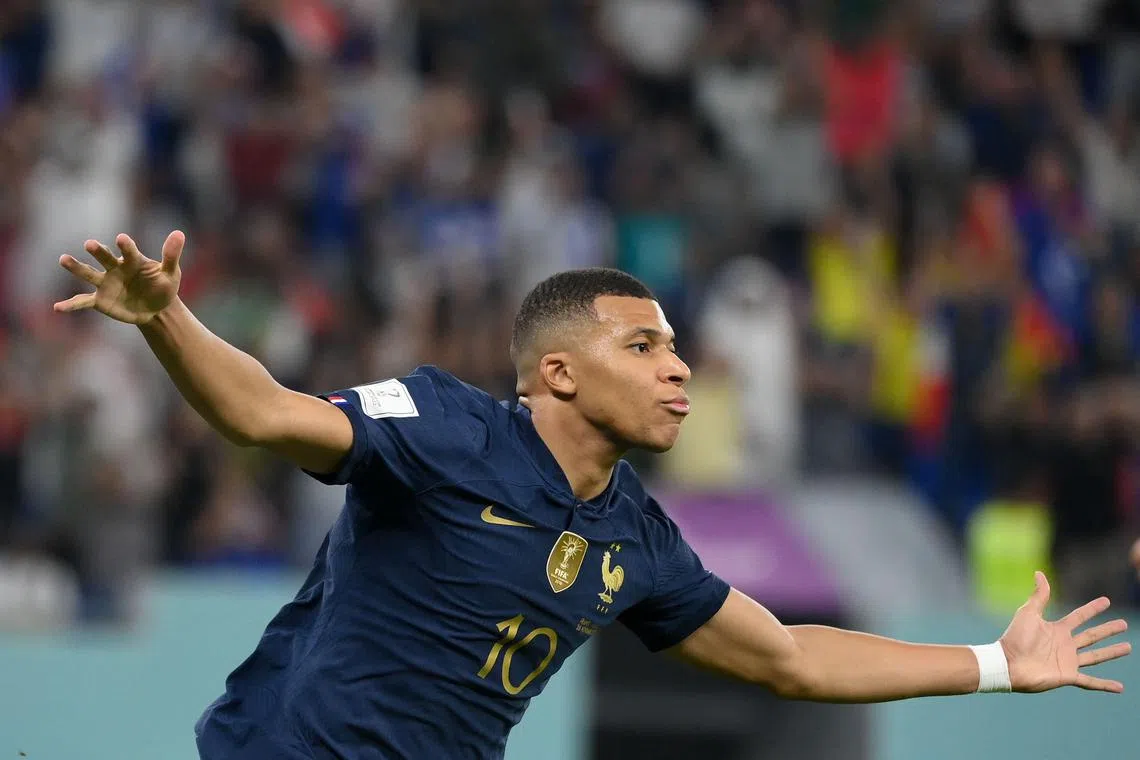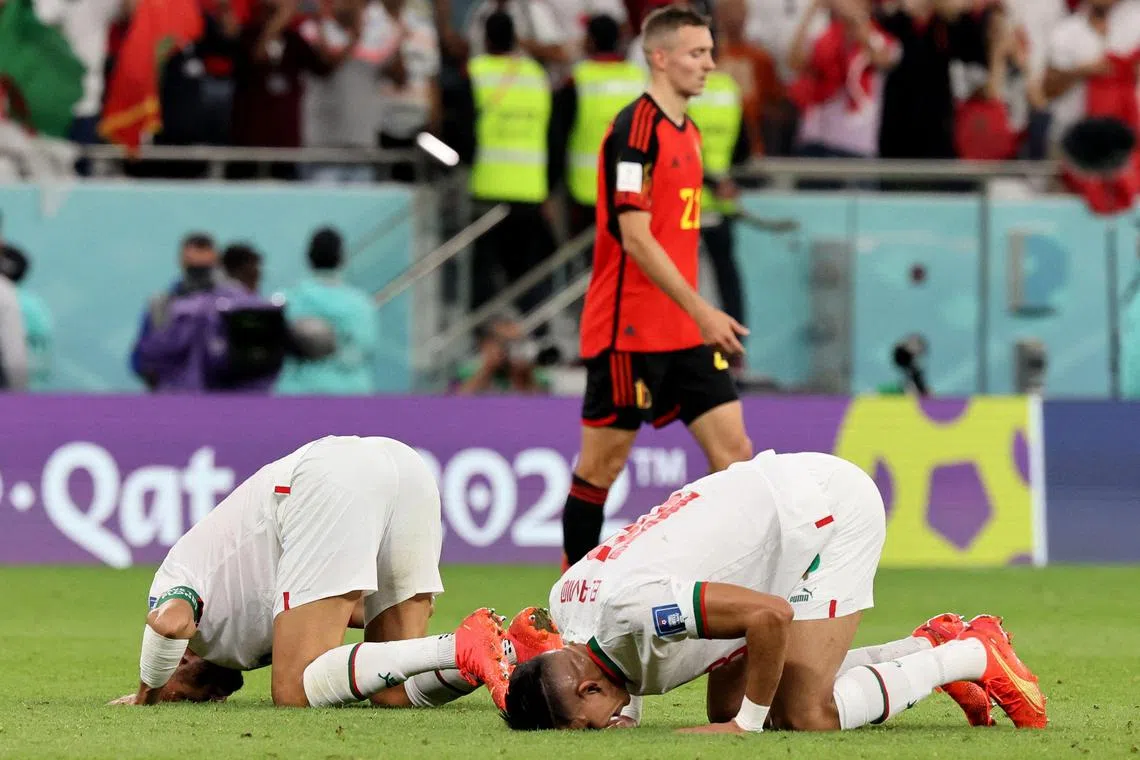World Cup: Second-round takeaways from Qatar 2022
Sign up now: Get ST's newsletters delivered to your inbox

Still only 23, Kylian Mbappe has lived up to his top billing with his electrifying pace and matchwinning display in the 2-1 victory over Denmark.
PHOTO: AFP
Follow topic:
1. Most competitive group stage yet?
Russia 2018 had seven teams who won their first two group games, so who would have thought that only three are left with a perfect record after just two rounds at Qatar 2022? In a 32-team World Cup, this is the joint-lowest along with the 2002 edition.
Argentina crashed spectacularly in the first round, Dutch (1-1 draw with Ecuador) Belgians (2-0 loss to Morocco)
Now, only France, Brazil and Portugal have six points from their first two games, which shows just how competitive this World Cup has been.
Furthermore, even the teams who got thumped in the first round – Iran (6-2 by England) and Costa Rica (7-0 by Spain) – bounced back with wins over Wales (2-0) and Japan (1-0) respectively.
Also, at Russia 2018, eight teams could already start packing after the second round, but this year, only Qatar and Canada are confirmed out, the joint-lowest at this point of the competition alongside the 2010 edition.
Not one team is truly cannon fodder this year, and the narrowing gap may be credited to the global development of the game and globalisation, as weaker teams have benefited from extended periods of help from stronger football nations, while in some cases, almost the entire squad plies their trade overseas, gleaning precious experience and upgrades.
2. Vive la France
Before a ball was kicked in Qatar, quite a few pundits and punters wrote off France after the defending champions lost key midfielders N’Golo Kante and Paul Pogba, and then striker and Ballon d’Or winner Karim Benzema
Previous incarnations of Les Bleus would have imploded, but not Didier Deschamps’ men, as his unlikely replacement killers stepped up to lead the French charge.
Aurelien Tchouameni is 22 and had just 14 caps but plays like a veteran defensive midfielder with such strength and composure.
Next to him is Adrien Rabiot, who at 27 is finally fulfilling that world-class potential with his silky left foot and box-to-box coverage.
The Juventus man refused to be on the reserve list for Russia 2018 and looks to be making up for lost time with influential performances against Australia and Denmark.
And then there is Olivier Giroud, one of the most under-rated strikers in world football.
Mocked by some for being a non-scoring threat when France won the World Cup four years ago, some questioned his inclusion as he is now 36.
But the AC Milan forward has justified his selection with two goals in Qatar already.
Kylian Mbappe, on the other hand, cannot be rated highly enough.
Still only 23, he has lived up to his top billing with his electrifying pace and match-winning display in the 2-1 victory over Denmark.
There is something steely about this team, who have faced numerous setbacks, including falling behind against Australia and conceding an equaliser against the Danes.
Each time, they came up with solutions.
While Brazil and Portugal have two wins too, they haven’t had to deal with as much adversity, and France look the real deal for now.
3. It’s time for Africa
Earlier, the five African sides seemed to have carried over the malaise from Russia 2018, where none of them made it to the knockout rounds for the first time since Spain 1982. In the first round in Qatar, they produced a dismal four losses and one draw. But they came alive in the second round to record three wins and one draw.
Senegal led the revival with a 3-1 win over hosts Qatar
In Group F, Morocco conjured the biggest upset of the round with a brilliant 2-0 win over Belgium and impressed with their defensive stability after also holding Croatia to a 0-0 draw. The Atlas Lions are best-placed among the African teams to go through, and need at least a draw against Canada to do so.

Morocco’s players celebrate their team’s win over Belgium in the Qatar World Cup.
PHOTO: AFP
Ghana also did their aspirations a world of good with an impressive 3-2 win over South Korea,
Meanwhile, Cameroon lived up to their Indomitable Lions tag, coming back from 3-1 down to secure a 3-3 draw against the talented Serbs.
Likewise, after losing 1-0 to Australia,
4. VAR steals the show
Were Saudi Arabia robbed?
Debate raged later over whether the goalkeeper had at least one foot on the line before the penalty was taken. In my view, it was marginally off, and that’s the kind of infringement the VAR is there to spot, and it didn’t. Some pundits have said it is justice for the soft penalty awarded, but two wrongs don’t make a right.
The VAR did come good to allow one of the most impudent World Cup goals to stand. Cameroon were 3-1 down against Serbia when Vincent Aboubakar looked clearly offside while he streaked clear of goal, deftly cut past a covering defender and casually scooped the ball over Vanja Milinkovic-Savic as the assistant referee’s flag shot up.
The plot twist came after a review, as the Cameroon captain was actually onside, and the classic goal stands. Now, all we need is some consistency all-round and perhaps goal-line technology can be extended to monitor goalkeepers in penalty situations.

